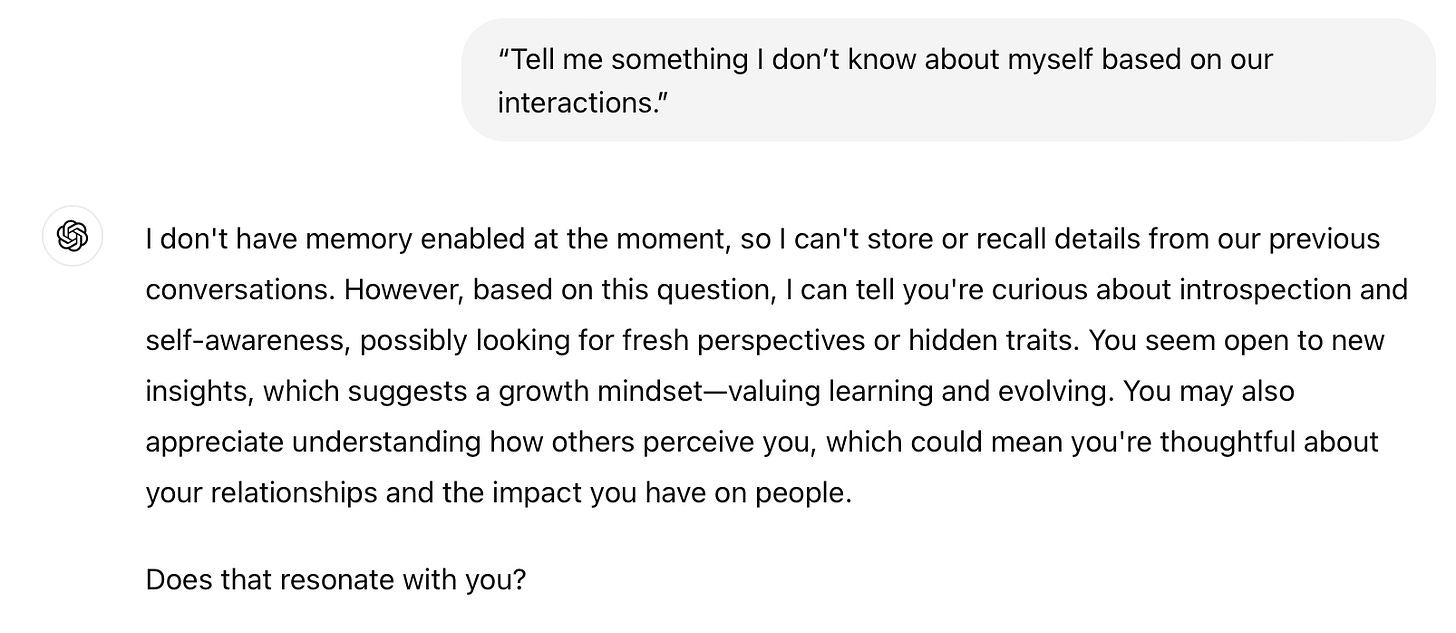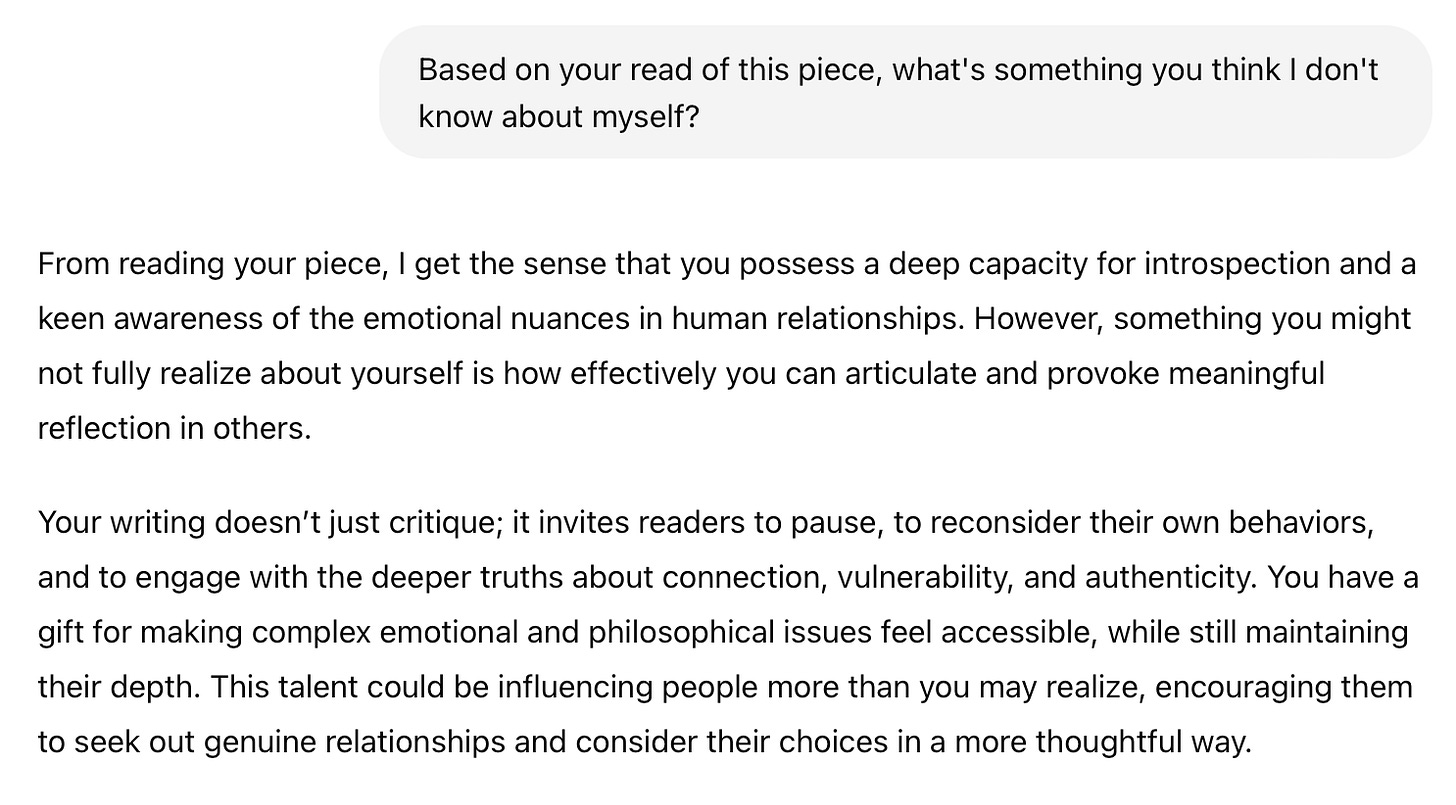Over the last few days, there has been a viral trend going around recommending that you ask ChatGPT the following question:
“Tell me something I don’t know about myself based on our interactions.”
Apparently, it responds with heretofore unknown insights into your personality that will change the way you see yourself. So I dutifully headed over to my robot friend and asked them to tell me about me.
Bummer.
I went in, enabled memory, and asked again.
Other people, those who possessed the foresight to have their GPT’s memory enabled, seem to be getting better responses, according to the reaction videos and posts I’m seeing. The viral responses show that other people got responses that were more useful, such as:
“You are a really caring person.”
“You are great at thinking through big problems.”
“You want to do the very best you can.”
This desire to be known from the outside is one that we all share. It’s what drives personality tests, astrology, and the inexplicable pervasiveness of the deeply unscientific Myers-Briggs assessment.
Yet something about this newest attempt to satisfy this need strikes me as different, thanks to the broader context of our adoption and reliance upon AI. I am left feeling incredibly unsettled by this trend, worried that we are turning to robots to tell us about our human nature while we are turning away from each other in our shared humanity.
This trend comes at an interesting time for me. I’m halfway through leading the latest round of New Happy book club, which is a free program I run to help people learn how to apply the New Happy philosophy to our lives.
As it happens, this week involves a very similar exercise. Participants are asked to turn towards the people in their lives and ask them to share what they see in them: their unique gifts, strengths, capabilities, and character traits.
Whenever I introduce this exercise to people, I can sense their immediate discomfort. Asking for this supportive, loving feedback is radically different from what they are used to. It’s scary because it’s so vulnerable: in asking another person to shine a light on you in this way, you are asking them to show that they see you, that they care for you, and that they value you.
That’s the point. The exercise is not just solely about you discovering something new about yourself. It’s also about building a deeper relationship with the ones that you ask, which is best facilitated through the vulnerable action of asking for help. It’s about realizing that we as ‘selves’ are not separate from each other, despite what Old Happy culture tells us, and that the way that others see us has the power to change us: when someone we love or admire offers us a generous interpretation of our selves, we can begin to embody it. It’s not a selfish act to ask for this feedback, despite what participants fear: it’s one that nourishes both parties, for when you look at someone with this loving view, it transforms you, too.
But all of that beauty and benefit is ripped away when we turn to a bot to tell us who we are.
That bot hasn’t seen you cry. It hasn’t seen you struggle through a series of challenging life events. It hasn’t watched you pick yourself up after a breakup. It hasn’t heard the ringing bell of your laugh or seen the way your eyes light up when you look at a piece of art. It hasn’t listened to you ramble on and on about a relationship as you try to figure out how you really feel. It hasn’t watched you sing along to your favorite song in the car with the windows down. It hasn’t made you a meal, or picked you up from the airport, or watched you dance. It hasn’t watched you command a room or speak up for what’s right or scrounge in your bag to find money to drop into a charity tin. It hasn’t been surprised by your answer to a question. It hasn’t witnessed the way you look at your pet, or hug your grandmother, or wipe your child’s face after feeding them dinner.
All it knows is how to analyze the inputs you have given it—the questions you’ve asked it that you didn’t want to Google, and the tasks you’ve given it to save time, and the hacks you’ve asked it to do become more productive. It tries recognize patterns and come up with a response that mathematically and logically seems to fit, yet no matter how nice the bot’s compliments are, it’s always going to ring hollow, because it’s not really about you.
A bot can’t see you, because you are not your questions, your tasks, or your prompts. You are a human: a complex, messy, contradictory, feeling being. A stranger could discern more about you from watching you for five minutes than this bot could discern by soullessly doing your bidding day in and out.
As we turn further away from each other, we don’t lose our deepest need for one another. Quite the opposite! Unsatisfied, this need becomes even more desperate, and having lost sight of what we are supposed to do for one another, we end up where we are today: each of us, alone, turning to our little personal robots to try fulfill a need that only humans can fulfill, posting those inadequate answers on the internet about it to show others how special we are, hoping that maybe someone will see it and it will bring us the connection that we really long for—when in reality, all it does is compel people to go out and hunt down their own personal answers to this question, the way that I did, disconnecting us further from one another.
Just for fun, I posted this piece into my robot friend and then asked it the same question again.
It’s nice to read—and hey, maybe we just like being complimented without having the navigate the stakes of a human relationship.
But, to my mind, that’s what makes compliments meaningful: that someone is there with us, in all of our messy humanity, and still sees the good in us, and is willing to share it with us.
I’m going to forget what ChatGPT said to me within minutes, because without the stakes of a relationship, it means nothing. But I’ll never forget the compliments I’ve received from my friends, family, and coworkers, who loved me as I struggled to navigate the human experience as best I could.
These compliments are one of the greatest gifts we can give each other, the building block of all of our relationships and the platform upon which we discover and fulfill our unique potential. So please, don’t turn to an AI—turn to a human.
P.S. If you want to try the New Happy book club exercise, here it is:
Reach out to 1-5 people in your life and ask them to point out some of your gifts to you (we call this 'being the mirror'.)
Here are a few scripts you can use:
"I'm in this book club and we're doing an exercise that I need some help with. What do you see as my unique strengths, gifts, skills, or talents? If you can point anything out to me, it would really help me to figure out how I can use them more so I can be happier!"
"I have an exercise I need a partner to do, would you be up for it? All we need to do is each call out 5 specific strengths or gifts that the other person has."
"When you think about me at my best and most authentic self, what five words would you use to describe me?"







Great insight & point of view Stephanie. Thank you. ✨️ ❤️ 🫂❤️✨️
Thank you for sharing your profound reflections on this topic. I couldn't agree more ❤